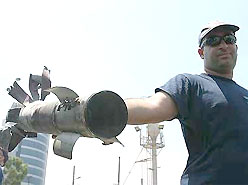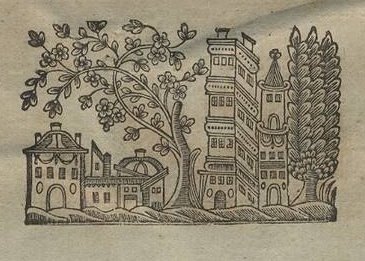Katyusha & Kedusha - Updating Sutzkever
As a college student, I first read Abraham Sutzkever's poem "The Lead Plates at the Rom Press" in my Yiddish Literature class. The imagery of this poem has always stuck with me since Sutzkever wrote about Jewish partisans melting down the lead plates that were used to print volumes of Talmud in order to make bullets to kill Germans in the Vilna Ghetto.
With this poem in the back of my mind, a thought popped into my head that twisted Sutzkever's concept a bit and gave it a modern spin.
The Pele Yoetz wrote:
"The printing press has brought much good into the world, allowing the grandeur of the words of Torah to be widely circulated. Since most of the scholars are too poor to publish their works they travel from town to town to gather funds for publication costs. By being generous to these scholars you will share in the merit of publishing their books. While all other expenditures for mitzvot are for the moment, this contribution is permanent. This book will be available to provide continuing guidance to our people for future generations."
Similarly, Reb Noson of Breslov wrote in Likutey Halachos (Kiddushin 3:22-23):
"Rebbe Nachman taught that by 'gathering souls together' the tzaddik is able to ascend to the source of the Torah and bring down lofty Torah ideas. The greater the gathering of souls, the greater the tzaddik's ability to reveal Torah.
A printing press operates on the principle of gathering letters together and arranging them in the type-mold. When writing Torah teachings by hand, one can only write a single letter at a time, whereas when printing, one can put enormous numbers of letters together at once and print full pages at a time. The gathering and joining together of the letters corresponds to the gathering of souls that leads to the revelation of Torah teachings - each letter is a spark of a soul. Printing the works of tzaddikim is thus a tremendous revelation of Torah, and that is why it is such a great mitzvah to give charity to finance the printings of these works. Faith and G-dliness are revealed throughout the world. One who gives charity for this purpose will be able to break his avarice and attain true repentance."
A year before the Jews of Gush Katif were expelled from their homes, the residents of Neve Dekalim used mortar shells that were fired at their settlement to make a menorah for Chanukah.
Just imagine if we could take the debris from Katyusha rockets that were fired at Eretz Yisroel, melt it down, and fashion printing plates out of it. Like the Shapiro Brothers of the famous Slavuta Printing House, we could toivel these plates in a mikvah and then use them to print seforim.
In Degel Machaneh Ephraim, Parshas Behaloscha, the Degel quoted a teaching from his grandfather, the Baal Shem Tov, on the subject of war, "All the war that exists in the world stems from the fact that the Malchus is not in a state of unity."
Reb Noson of Breslov said (Siach Sarfei Kodesh 181), "I fully believe that even one printed page brings about great rectifications in all the worlds".
Just imagine what great rectifications such a printing press could bring about; imagine the kedusha that such a printing press could generate.
A year before the Jews of Gush Katif were expelled from their homes, the residents of Neve Dekalim used mortar shells that were fired at their settlement to make a menorah for Chanukah.
Just imagine if we could take the debris from Katyusha rockets that were fired at Eretz Yisroel, melt it down, and fashion printing plates out of it. Like the Shapiro Brothers of the famous Slavuta Printing House, we could toivel these plates in a mikvah and then use them to print seforim.
In Degel Machaneh Ephraim, Parshas Behaloscha, the Degel quoted a teaching from his grandfather, the Baal Shem Tov, on the subject of war, "All the war that exists in the world stems from the fact that the Malchus is not in a state of unity."
Reb Noson of Breslov said (Siach Sarfei Kodesh 181), "I fully believe that even one printed page brings about great rectifications in all the worlds".
Just imagine what great rectifications such a printing press could bring about; imagine the kedusha that such a printing press could generate.
 (Picture by Niv Calderon)
(Picture by Niv Calderon) (Picture courtesy of Ha'aretz)
(Picture courtesy of Ha'aretz)










6 Comments:
I realize printing presses are constructed differently these days. You don't have to comment to tell me this. I was just trying to get out an idea that was stuck in my head for the past few days.
Interesting ASJ. I think one could make a huge menorah from the katyushas like the kind that the Chabadniks light in public places.
That would also be a good idea!
Cool. Reb Nosson's words are interesting. Wasn't he the one who did the dictation for Reb Nachman?
Yes, he was the one responsible for printing Rebbe Nachman's seforim.
" Reb Noson of Breslov said (Siach Sarfei Kodesh 181), "I fully believe that even one printed page brings about great rectifications in all the worlds". "
Rabbi Natan is refering about the printed of rabenu zal books (like likute moharan or ANY breslev book) and no others. That was once said rabenu zal "one page of my book can make tikkun to all!"
Post a Comment
<< Home